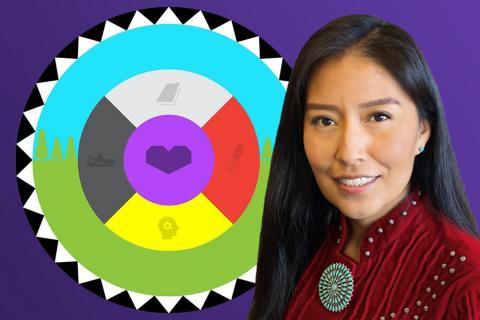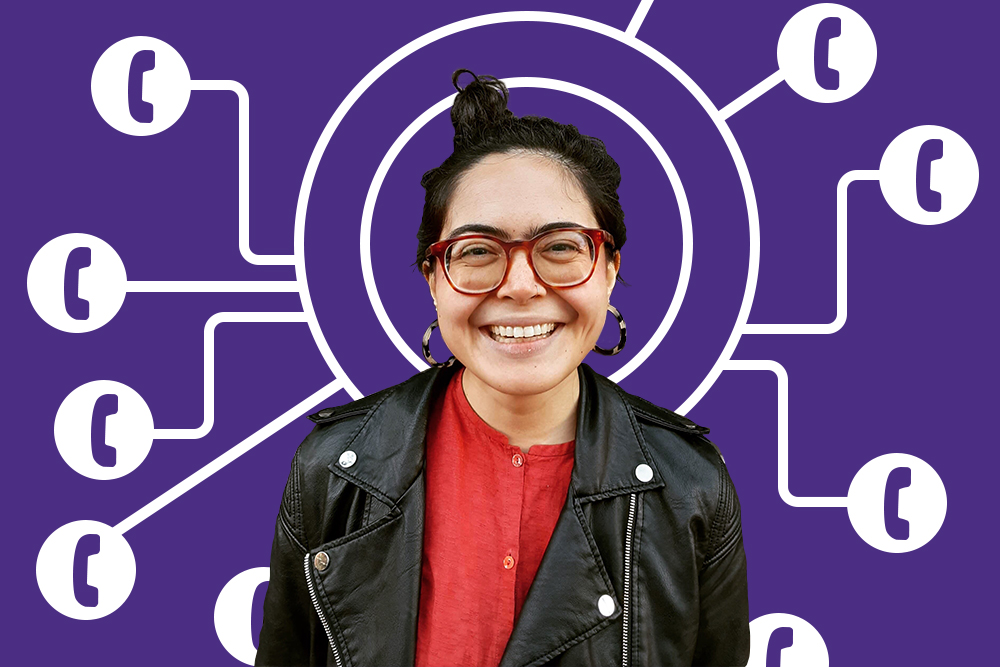
NWCPHP student funding recipient Celena McCray.
Celena McCray has been involved with local community health efforts since she was a youth growing up on the eastern edge of the Navajo Nation.
As she continued her work in public health, she realized that Indigenous based research, practices, and methods were rarely used within the field. McCray set out to help change this by partnering with Pacific Northwest tribal members and Elders to co-design an Indigenous-based framework that addresses the holistic health and wellness of American Indian and Alaska Native peoples, known as 49 Days of Ceremony.
Each year, the Northwest Center for Public Health Practice funds student projects — like McCray’s — in Alaska, Oregon, Idaho, and Washington. McCray is a 2019–20 school year recipient and earning her master’s in public health at the OHSU-PSU School of Public Health in Portland. She also works in suicide prevention at the Northwest Portland Area Indian Health Board.
The 49 Days of Ceremony framework stems from the need for culture-based prevention, education, and recovery options centered around Traditional Indigenous Knowledge. Indigenous communities have experienced a series of traumatic events over the centuries, which have had significantly harmful consequences for their health and well-being. Recognizing this history and impact, McCray and her partners are co-developing the 49 Days of Ceremony intervention to support people through a wide range of life experiences and wellness journeys — from opioid misuse to improving overall mental health — by focusing on healthy relationships.
“Indigenous adaptation is important, because existing models and frameworks within public health are not umbrella systems that work for everyone,” McCray said.
The 49 Days of Ceremony intervention would take place around a project, such as canoe building, cradle board making, community gardens, or a coming of age ceremony. The intervention is intended to improve interpersonal relationships through cultural knowledge and increase an understanding and application of Indigenous practices and knowledge. Ultimately, the goal is to support participants in learning about life issues and achieve awakening so they can become whole, healthy human beings living a full life.
“When people engage in a process, they can increase self-efficacy from their individual lives and their community,” McCray said.
McCray and her partners are in the processes of developing a guide to lead them through the design of the 49 Days of Ceremony intervention. This guide includes a two-eyed seeing approach that incorporates Western theories and ideas about public health, along with Traditional Indigenous Knowledge, including how many American Indian and Alaska Native traditions look to the medicine wheel to define wellness as a balance between intersections of life.
“I’ve had the opportunity to unlearn Western processes and relearn through Indigenous processes,” McCray said. “I am being mindful of my positionality, which has helped me engage with partners on a more personal level. We are giving each other time and space to share our expertise and experiences. And a lot of that expertise is Traditional Indigenous Knowledge, not necessarily models and frameworks and theories within the Western context.”
The 49 Days of Ceremony framework includes seven aspects of a human being: emotional health, physical health, mental health, spiritual health, Mother Earth (the physical environment and all the living things in it), Father Sky (the spiritual realm), and volition (awakening of an individual’s will). These aspects are the foundation of the project-based intervention.
“Most Indigenous communities have common values, such as relationships and connectedness to the world around us,” McCray said. “One of the things we noticed as a team was the need to provide people a way to awaken their will, their volition, to have better health outcomes as a whole person. We needed a framework that not only focuses on physical health, but emotional, spiritual, and mental health.”
As the work continues, McCray is gathering input from partners and Elder advisors on a bi-weekly basis. Prior to COVID-19, she was able to meet with people in-person. “When working with tribal communities, you meet them where they are,” she said. “I had the opportunity to meet them face-to-face, which is really important, because the framework we are trying to develop is about building relationships based on culture.” The NWCPHP student stipend is what made vital travel and connections possible, McCray added.
The team is now navigating their next steps since COVID-19 has spread across the country. Initially, they had wanted to pilot the project with tribal communities, but are now taking the time to solidify the model and reflect intergenerational, intertribal, and interdisciplinary relationships within the project.
NWCPHP funding is now available for students completing public health projects during the 2020–21 school year. Learn more about the application process and deadlines and read more about funded projects from past years.
The Northwest Center for Public Health Practice at the University of Washington School of Public Health is one of ten regional Public Health Training Centers funded by the Health Resources and Services Administration.


